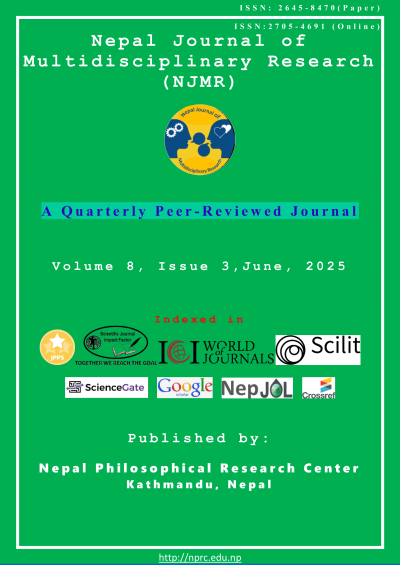Knowledge-Oriented Leadership and Organizational Performance: Mediating Role of Knowledge Management in the Banking Industry
DOI:
https://doi.org/10.3126/njmr.v8i3.80358Keywords:
Knowledge Management, Knowledge-Oriented Leadership, Organizational Performance, Banking, NepalAbstract
Background: Effective leadership in managing knowledge resources has become essential for organizational success in today's information-driven and competitive economy. As a knowledge-intensive industry, banking depends on strategically applying knowledge assets to improve operational effectiveness, innovation, and service quality. Consequently, by cultivating a culture that encourages knowledge creation, sharing, and application, Knowledge-Oriented Leadership (KOL) has become a significant performance driver.
Objectives: Using the Knowledge-Based View and the Path-Goal Theory, this study investigates how Knowledge-Oriented Leadership affects Organizational Performance in Nepal's banking sector, emphasizing the mediating role of Knowledge Management procedures.
Methods: This research adopts a descriptive and causal design, using non-probability convenience sampling from 319 employees of commercial banks in Kathmandu. A structured questionnaire was used to collect data, and regression modeling, correlation analysis, and mediation techniques were used to assess the hypotheses.
Results: The results show a strong positive correlation between organizational performance and knowledge-oriented leadership, suggesting collaborative leaders improve performance. Further, mediation analysis demonstrates that this relationship is partially mediated by knowledge management processes, emphasizing both the knowledge-driven and direct effects of leadership on performance.
Novelty: This study is among the limited empirical studies in Nepal exploring how KOL drives organizational performance through KM processes. By extending leadership and KM theories into a developing economy context, it offers valuable theoretical and managerial contributions for improving performance in knowledge-intensive industries.
Downloads
Downloads
Published
How to Cite
Issue
Section
License
Copyright (c) 2025 The Author(s)

This work is licensed under a Creative Commons Attribution-NonCommercial 4.0 International License.
This license enables reusers to distribute, remix, adapt, and build upon the material in any medium or format for noncommercial purposes only, and only so long as attribution is given to the creator.




